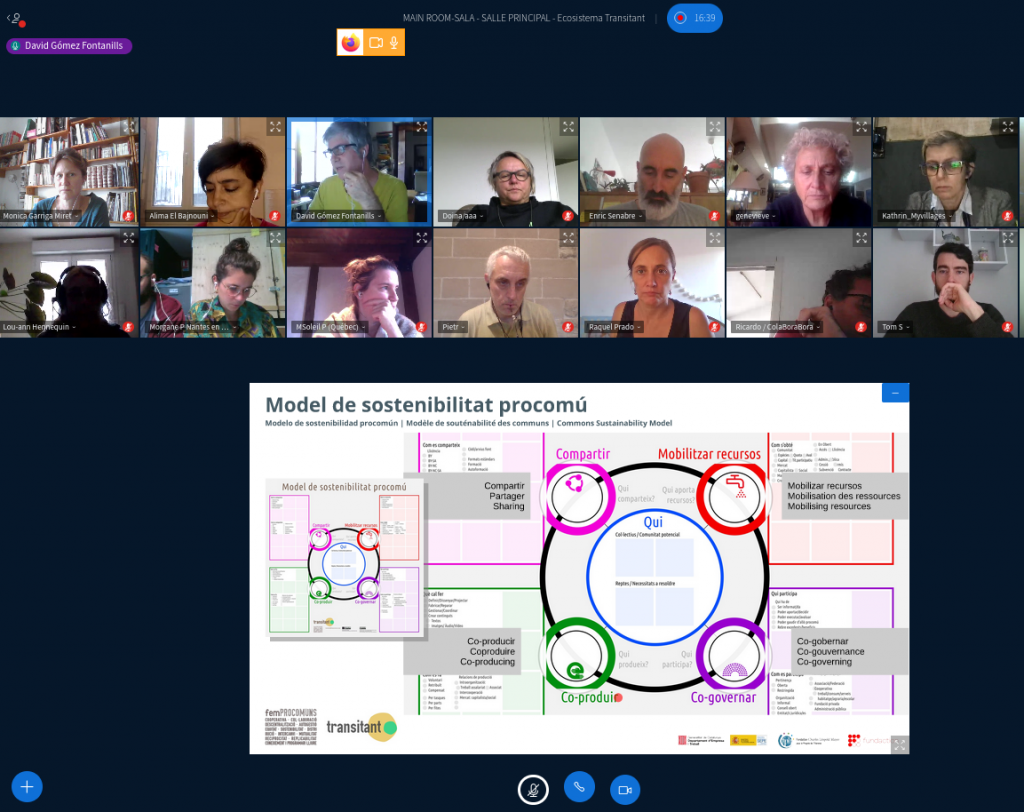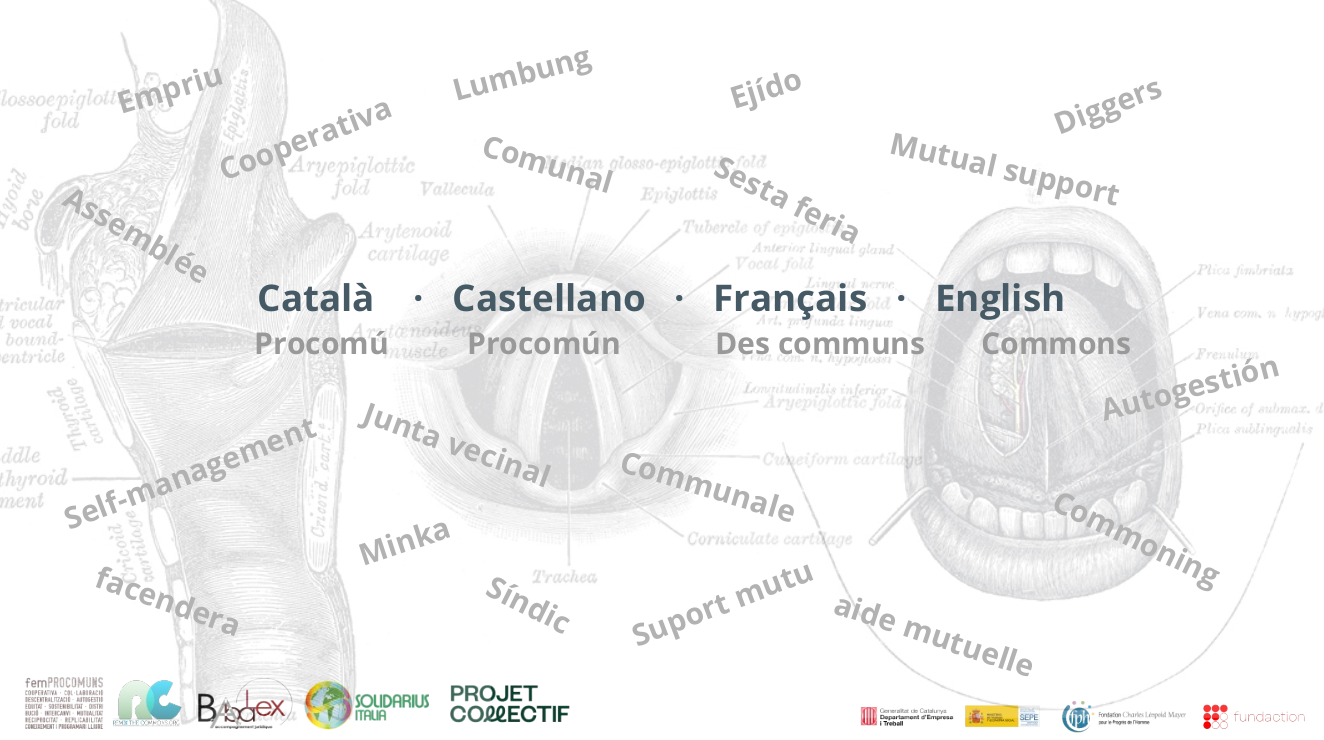This post is also available in: Español (Spanish) English
Després de 8 sessions presencials temàtiques i una d’intercooperació, hem reunit per videoconferència persones i organitzacions que estan treballant la transició cap a models socioeconòmics procomuns a diferents llocs del món. Hi va haver 12 presentacions de models, metodologies i pràctiques que ens ajuden a facilitar processos, acompanyar col·lectius o treballar en els projectes i xarxes on participem. La sessió va servir de cartografiat per saber com ho fan els altres, inspirar-se mútuament i agafar ganes de conèixer-se més a fons.
Aquesta setmana vam fer la Trobada Internacional Ecosistema Transitant: Models per a sostenir els procomuns.
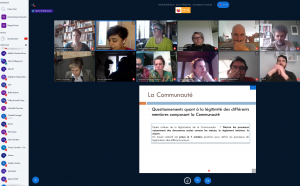 La vam organitzar des de femProcomuns, com a part del Grup de Treball pels Ecosistemes Procomuns, juntament amb Remix the Commons, BABalex, Projet Collectif i Solidarius Italia.
La vam organitzar des de femProcomuns, com a part del Grup de Treball pels Ecosistemes Procomuns, juntament amb Remix the Commons, BABalex, Projet Collectif i Solidarius Italia.
És fruit de la confluència de diversos projectes finançats per la subvenció singulars de la Generalitat de Catalunya, Remix the Commons, Fondation Charles Leopold Mayer pour le progrès de l’Home, i una ajuda que el grup de treball va demanar a Fund Action.
Per a femProcomuns, aquesta sessió és un punt d’intersecció entre el treball que estem fent en local, a Catalunya -aquest any amb «Ecosistema Transitant» hem fet vuit sessions temàtiques arreu del país i una sessió final d’intercooperació a Barcelona-. i la feina que estem fent amb gent d’altres llocs, que també treballen els procomns.
Ecosistema Transitant, té antecedents en les 5 edicions del programa de La Comunificadora, cursos sobre cooperativisme de plataforma, sessions i tallers en postgraus, hackathons, acompanyament de projectes individualitzats, i també en el desenvolupament dels propis projectes que impulsem des de femProcomuns:
SomNuvol.coop, per proveir-nos d’eines digitals mancomunades, a persones individuals i entitats sòcies de consum.
Teixidora.net, una wiki semàntica per compartir apunts i documentació en obert
Xoic, una xarxa d’antenes, Sensors i actuadors compartida, per possibilitat la internet de les coses.
ComSoc, Comunicació social per empoderar les persones com a protagonistes dels mitjans de comunicació, a través de l’educomunicació.
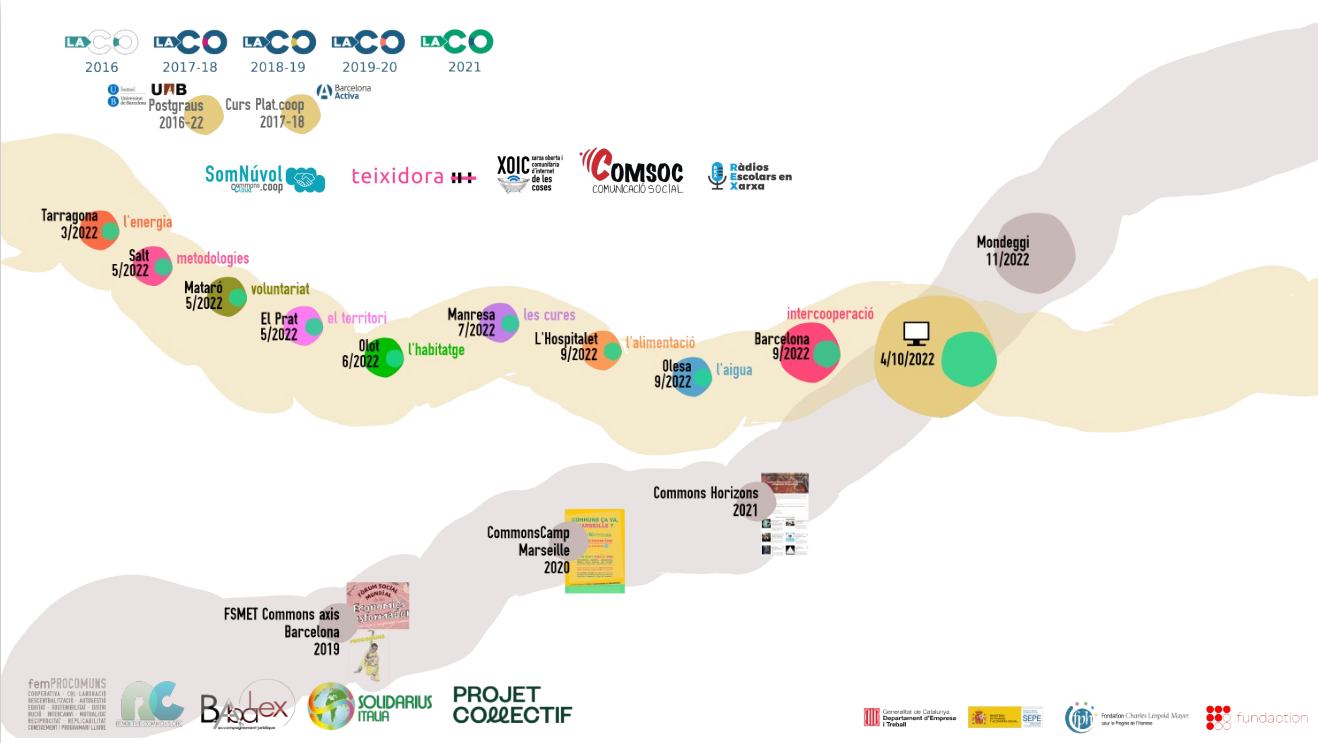 Això intersecciona amb el treball conjunt que hem anat fent en els últims anys amb algunes persones que van participar a la Trobada. Hem estat juntes a la confluència procomú del Forum Social Mundial de les Economies Transformadores (FSMET) el 2019, al CommonsCamp de Marsella de 2020, a les trobades d’Horitzons Comuns el 2021. Aquesta confluència ja era hereva de la feina feta en altres entorns, l’Assemblea Europea dels Comuns, les Jornades Procomuns que es van organitzar des de Dimmons a Barcelona i moltes altres iniciatives que seria impossible d’enumerar. La d’avui, és la primera de dues sessions de treball, proposades pel Grup de Treball pels Ecosistemes Procomuns. La segona, serà presencial, a Mondeggi (Itàlia), el 14 i 15 de novembre.
Això intersecciona amb el treball conjunt que hem anat fent en els últims anys amb algunes persones que van participar a la Trobada. Hem estat juntes a la confluència procomú del Forum Social Mundial de les Economies Transformadores (FSMET) el 2019, al CommonsCamp de Marsella de 2020, a les trobades d’Horitzons Comuns el 2021. Aquesta confluència ja era hereva de la feina feta en altres entorns, l’Assemblea Europea dels Comuns, les Jornades Procomuns que es van organitzar des de Dimmons a Barcelona i moltes altres iniciatives que seria impossible d’enumerar. La d’avui, és la primera de dues sessions de treball, proposades pel Grup de Treball pels Ecosistemes Procomuns. La segona, serà presencial, a Mondeggi (Itàlia), el 14 i 15 de novembre.
Ecosistema Transitant a Catalunya
Des de femProcomuns, aquest any, amb Ecosistama transitant, hem estat co-organitzant, amb nombroses entitats afins, 8 sessions temàtiques a diferents llocs del país (Tarragona sobre energia, a Salt sobre Metodologies, a Mataró sobre Voluntariat, al Prat de Llobregat sobre la defensa del territori, a Olot sobre Habitatge, a Manresa sobre Cures, a l’Hospitalet sobre Alimentació i a Olesa de Montserrat sobre l’Aigua). Hi hem convidat persones que estan en projectes d’auto-organització i comunitaris.
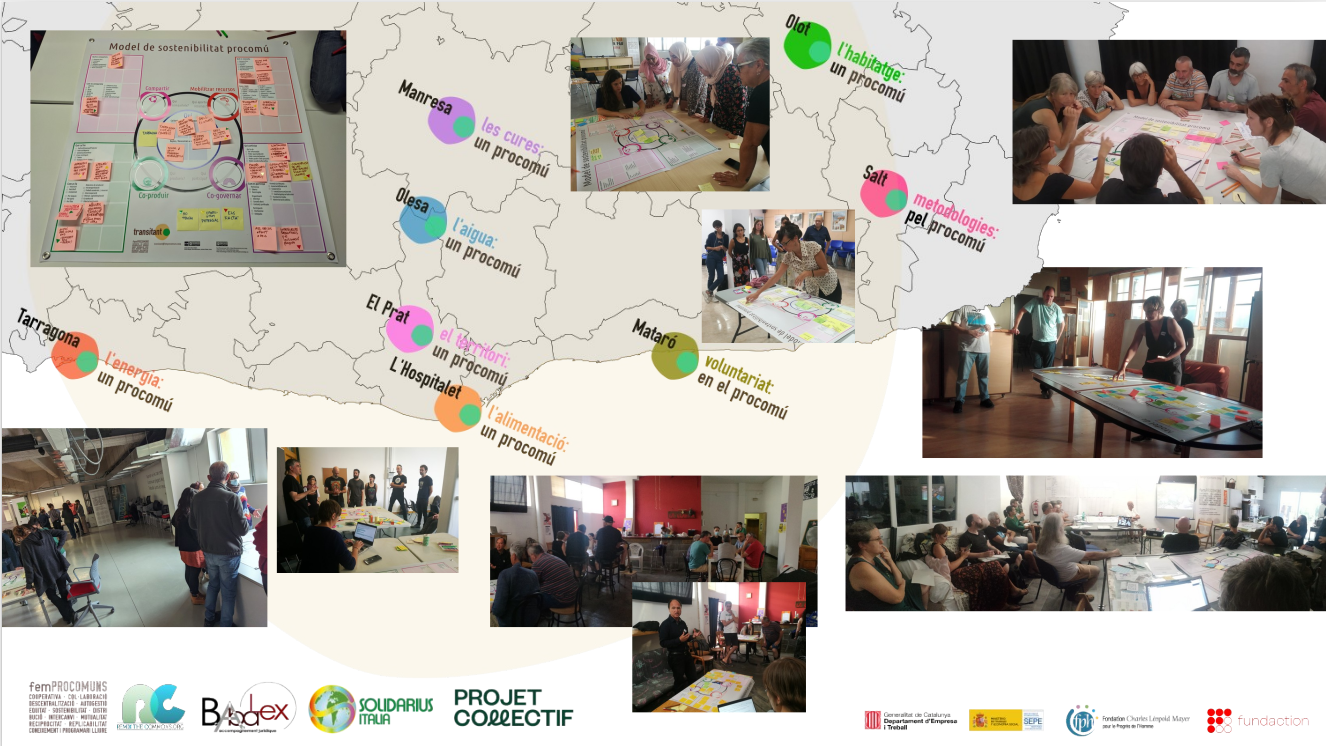 Hem fet servir el Model de Sostenibilitat del Procomú per analitzar-los conjuntament, des de 5 dimensions: comunitat, recursos, treball/producció, compartir coneixement i governança.
Hem fet servir el Model de Sostenibilitat del Procomú per analitzar-los conjuntament, des de 5 dimensions: comunitat, recursos, treball/producció, compartir coneixement i governança.
Ens fixem en projectes on hi ha un col·lectiu que s’auto-organitza articulant una comunitat per resoldre necessitats, superar reptes, o gestionar recursos (o les tres coses juntes) i que genera formes d’autogovernança i normes per la seva sostenibilitat, present i futura. Aquest model socioeconòmic procomú, basat en l’auto-organització, l’autogestió i l’autogovern, té interseccions amb altres models com el mercat social i els serveis públics. Mirem de visibilitzar-ho i entendre-ho.
Però el Model de Sostenibilitat del Procomú és un model antagonista del model capitalista, extractivista, basat en maximitzar el lucre d’uns pocs servint-se de la interacció del mercat, l’estat liberal i organitzacions supraestatals, que sustenten l’actual sistema dominant.
Totes les persones i entitats que vam convidar, estan fent coses per als procomuns i en seguiran fent. En algunes coincidirem, i en altres no. Les sessions que fem, i les que hem fet aquest any, mai les hem entès com un punt d’arribada, ni com un punt de partida, sinó com un punt de pas. Aquesta també l’enteníem així.
Vam explicar el Model de Sostenibilitat del Procomú que hem estat elaborant, posant en pràctica i modificant els últims anys. La vam presentar, conscients que és només una eina, i que n’hi ha d’altres. Per això, vam voler conèixer tant experiències que han observat, utilitzat o adaptant aquest model com altres models, metodologies i maneres de fer entorn les pràctiques per transitar cap a modes socioeconòmics procomuns.
Experiències: models, metodologies i pràctiques
El Model de sostenibilitat del Procomú. femProcomuns. David Gómez Fontanills
En els darrers anys, des de femProcomuns hem desenvolupat un enfocament i una eina de suport per als col·lectius que busquen oferir solucions als reptes dels seus territoris, i l’hem posat en pràctica a través de programes i activitats de transició.
És un model conceptual que té en compte cinc dimensions interconnectades en un projecte comú, 5 pilars: comunitat, recursos a mobilitzar, co-producció, compartir coneixement i co-governança . És un model de com funciona o vol funcionar un projecte. Utilitza un diagrama visual que ens ajuda a localitzar i qualificar els comuns respecte a aquestes cinc dimensions i facilita trobar l’equilibri entre elles.
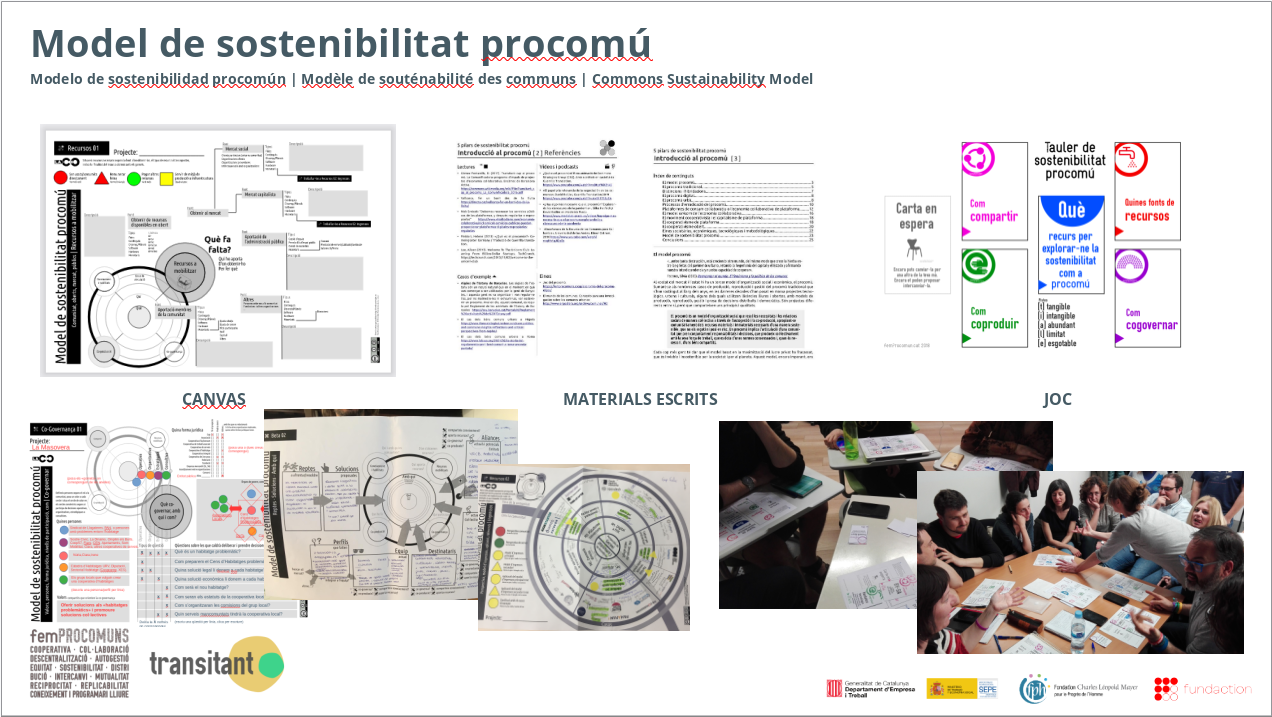
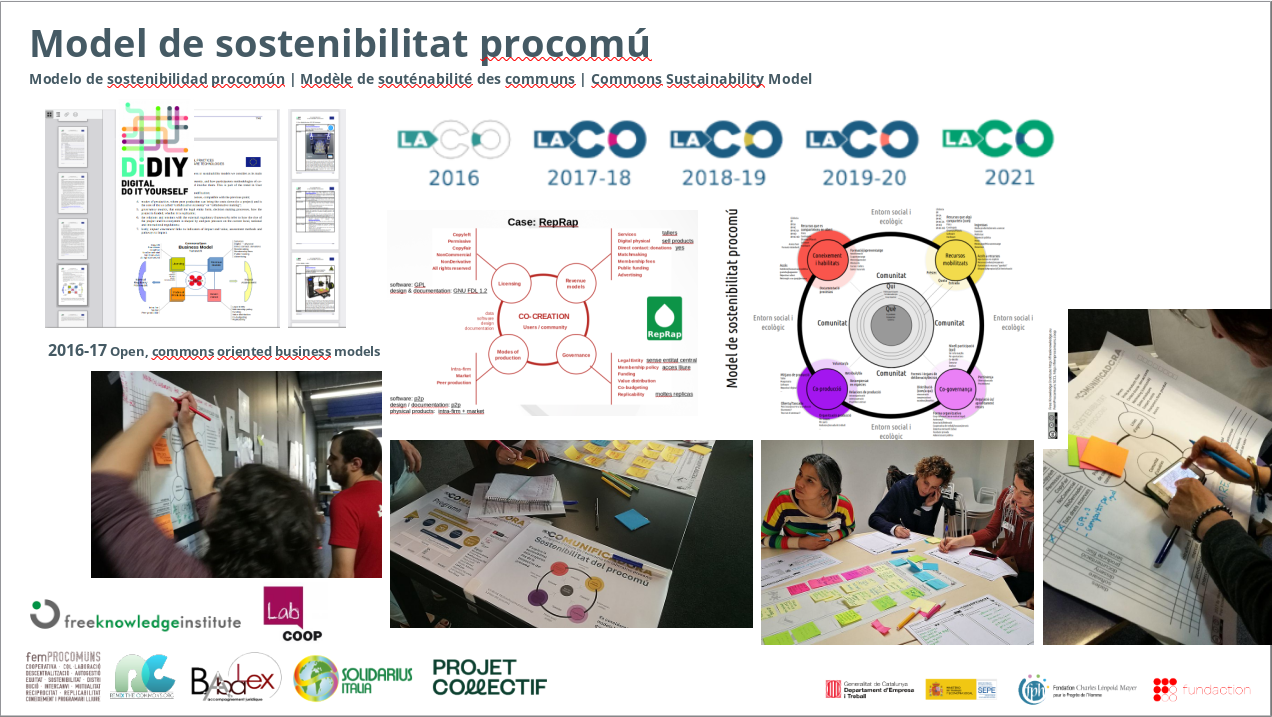
Construint una economia comunitària col·laborativa: El cas de La Comunificadora. Dimmons/La Coop des Communs. Vera Vidal
La investigadora Vera Vidal va analitzar el programa de La Comunificadora, un programa d’acceleració per a l’economia col·laborativa procomú on es desenvolupa el Model de Sostenibilitat del Procomú, tal com és ara. Observa com en lloc de reforçar visions capitalistes de l’economia i un model d’emprenedoria lligat a aquestes, La Comunificadora pot ser un espai per produir una economia diversa. Per aconseguir-ho, l’anàlisi des de la perspectiva Gibson-Graham planteja la necessitat de combinar una política del llenguatge, una política del subjecte i una política de l’acció col·lectiva.
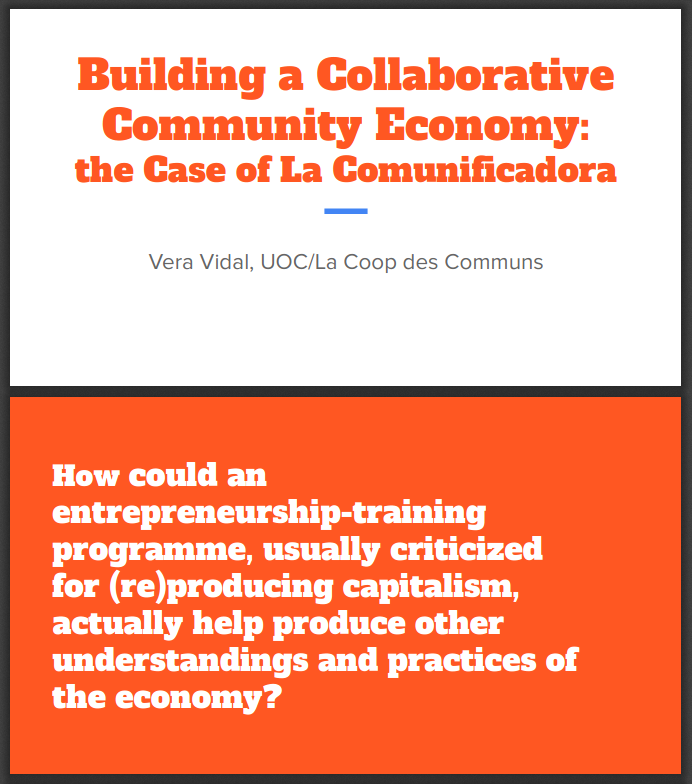
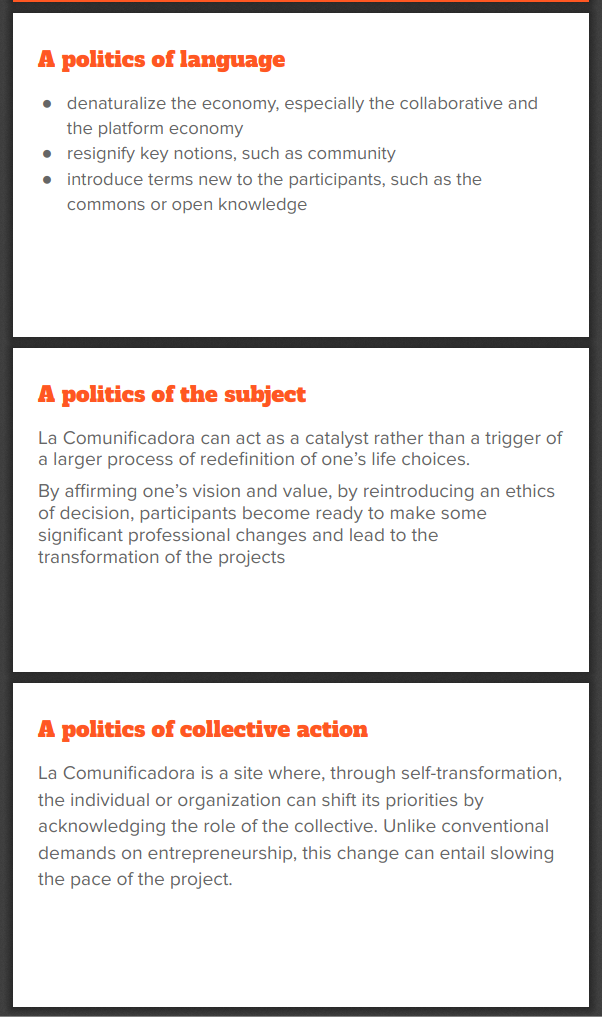
Cultivar el procomú, d’Europa al Quebec. Projet Collectif. Marie Soleil L’Allier
Des del gener del 2021, la comunitat de pràctica Cultivating the Commons es reuneix mensualment al Quebec, amb la intenció de convocar i connectar en xarxa persones interessades en els comuns i discutir les diferents eines, enfocaments i mètodes adaptats als comuns. Projet Collectif, forma part de l’Equip de Treball pels Ecosistemes Procomuns, en el marc del qual es fa autoformació sobre els diferents models, metodologies, pràctiques i eines desenvolupades i posades en pràctica localment pels diferents actors dels comuns. En els últims mesos s’ha estat treballant per la traducció al francès del Model de Sostenibilitat del Procomú, els llenços de treball, el joc i els textos explicatius del model.
- Article en francès https://femprocomuns.coop/wp-content/uploads/2022/10/Cultiver-les-communs_MS_S_93.pdf
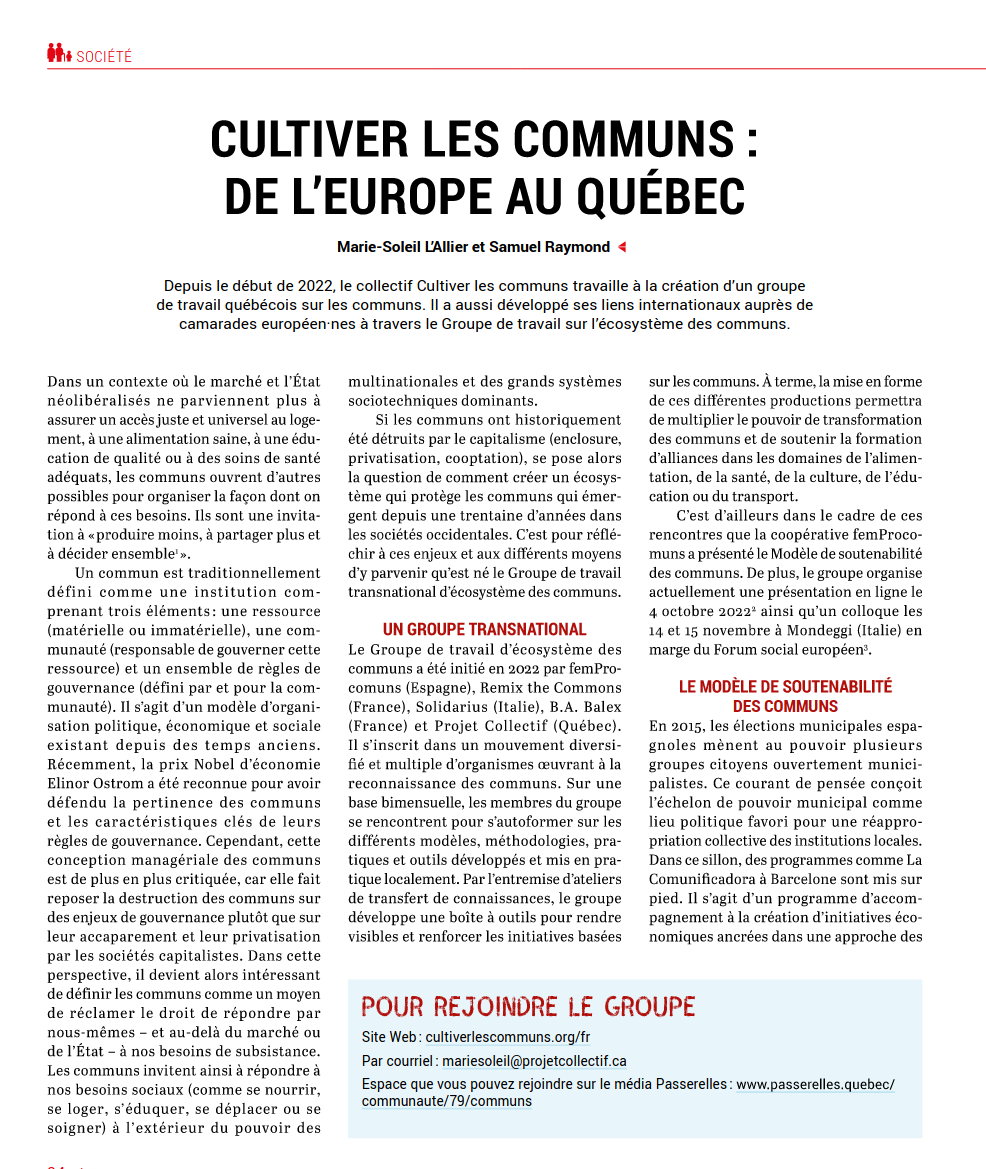
De l’alimentació a la governança, produir coneixement situat amb l’Escola dels Comuns. Frédéric Sultan Remix the commons, AFAP, B.A.Balex
Hi ha dos projectes en curs, un entorn de l’alimentació i l’altre sobre la governança. L’Escola dels Comuns gira sobre la governança, és una experiència d’auto-aprenentatge sobre les formes de governança del procomú amb els habitants de La Chapelle (barri de París) i els seus col·lectius i organitzacions. A fi d’acollir i fer que diverses activitats coexisteixin en el barri, proposen produir i experimentar diverses d’eines per a una governança viva dels espais i projectes. Aquest coneixement serà recollit a través de 5 camps de treball del procomú amb la finalitat de convertir-se en un recurs compartit. Cada camp de treball serà l’ocasió de realitzar junts un recurs nou per fer l’Escola dels Comuns al barri. En el segon camp de treball, s’analitzaran projectes amb el Model de Sostenibilitat del Procomú, i es treballarà amb el Joc de l’Economia del procomú.
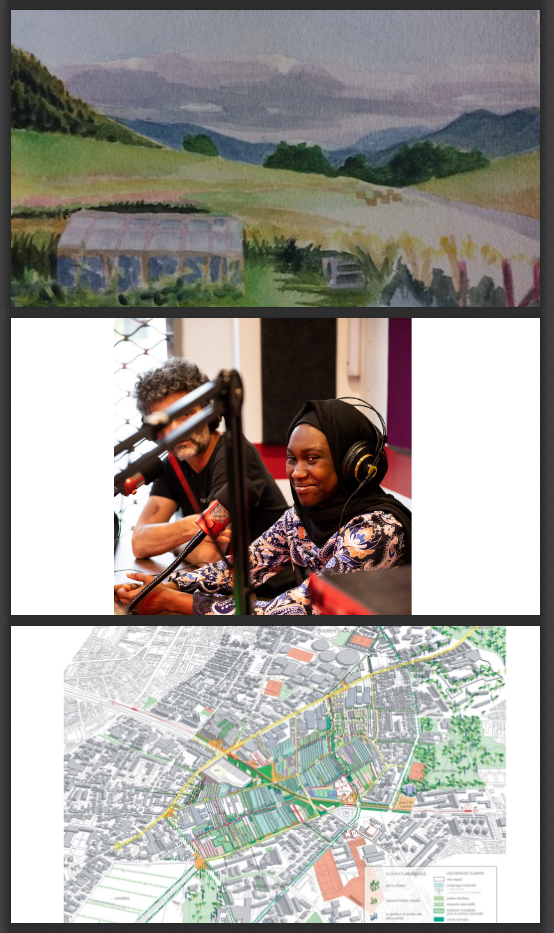
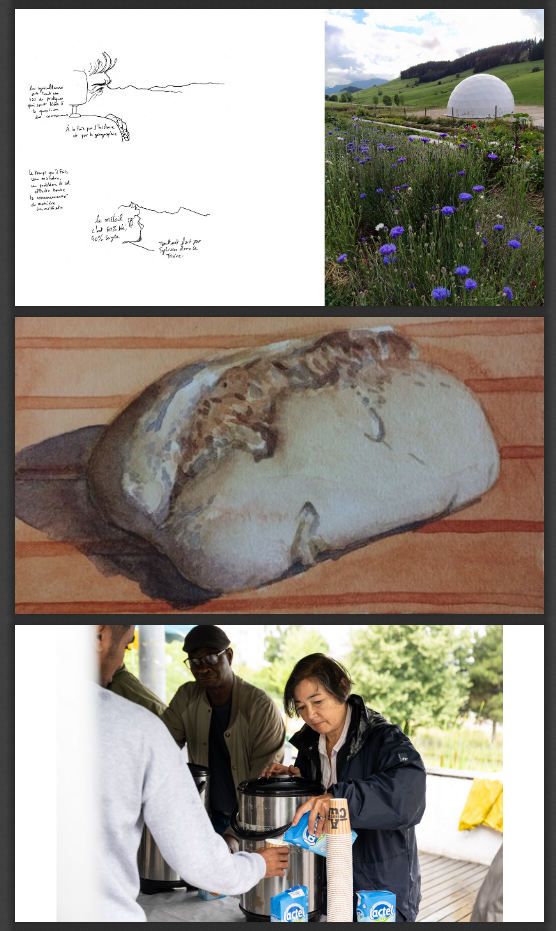
Cas d’ús del Model de sostenibilitat del Procomu a Foresta, Marsella. Alima El Bajnouni
Treball d’acompanyament a un projecte de gestió ecològica del Parc de Foresta, a Marsella, en el marc d’una convocatòria de Fondation France “Reinventar els nostres comuns per amplificar la transició ecològica.”
Foresta és un terreny de propietat privada, gestionat des del 2016 per l’associació Yes We Camp, però que al 2019 va passar a mans de l’Association Foresta. Alima El Bajnouni, ha fet un pla d’acompanyament, basat en 16 entrevistes, els resultats de les quals ha analitzat des de la perspectiva del Model de Sostenibilitat del Procomú i que li ha servit per traçar un full de ruta per al projecte.
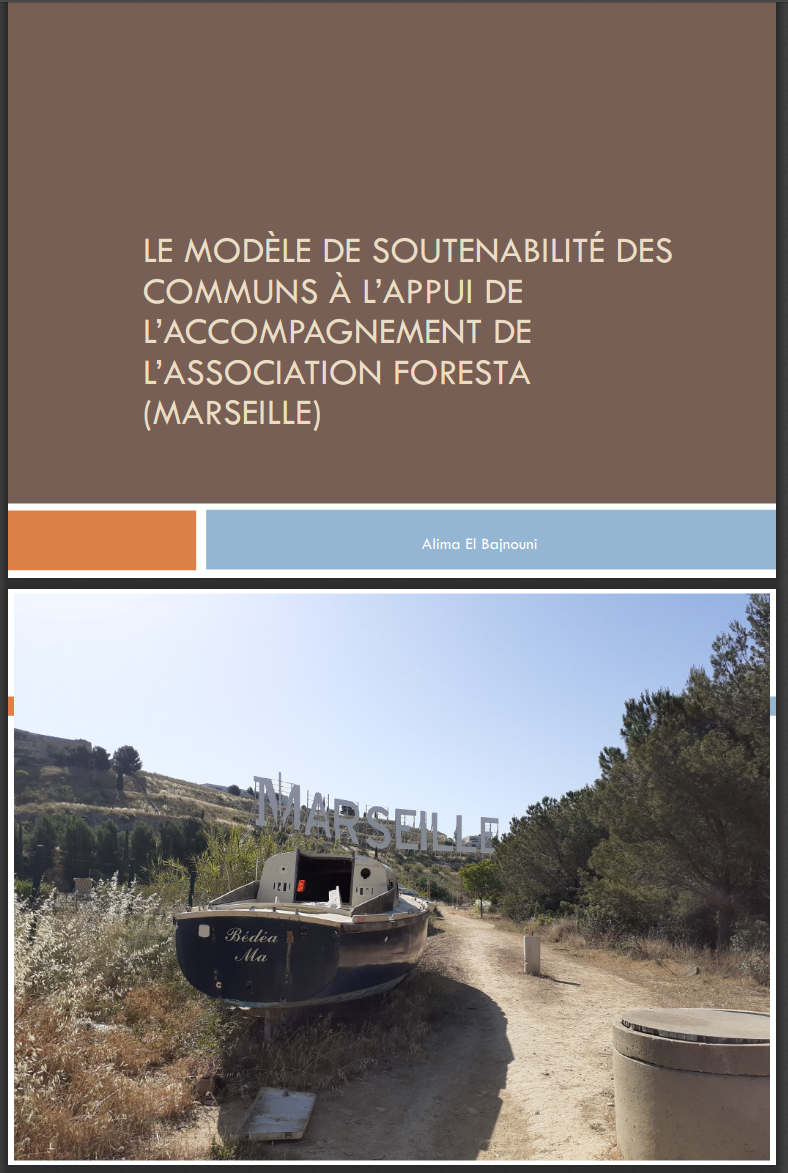
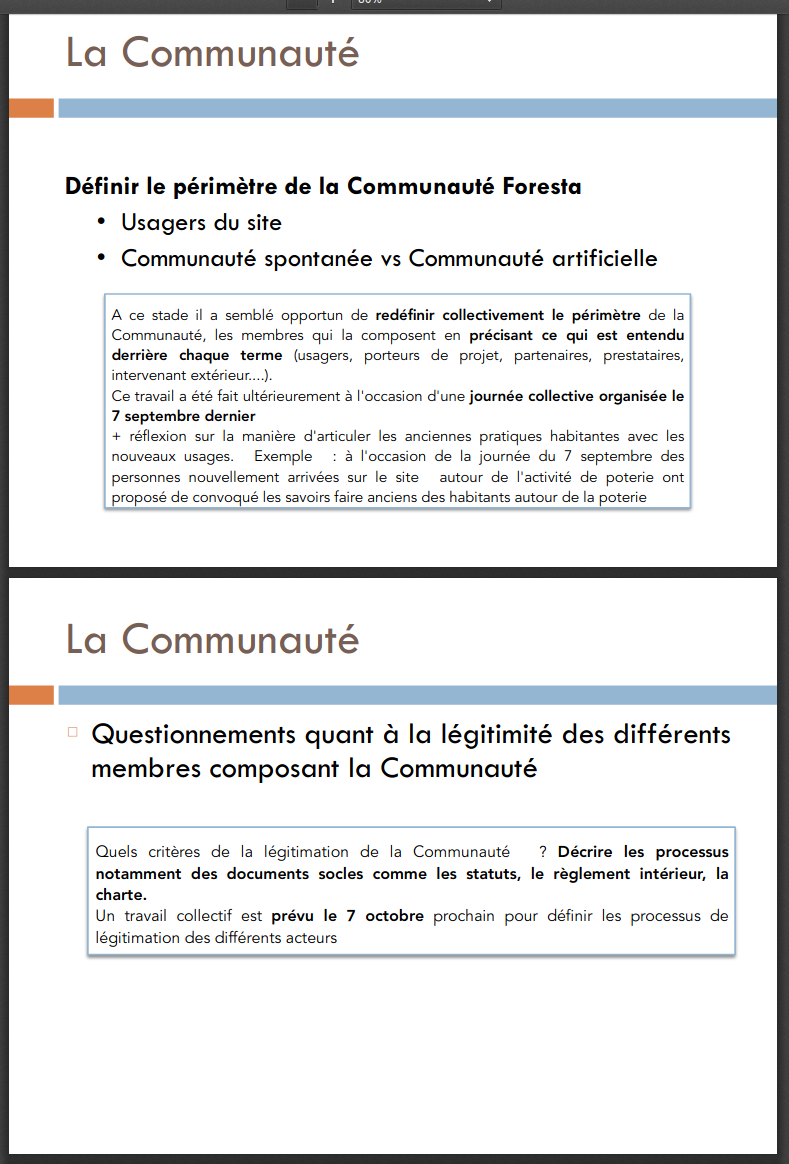
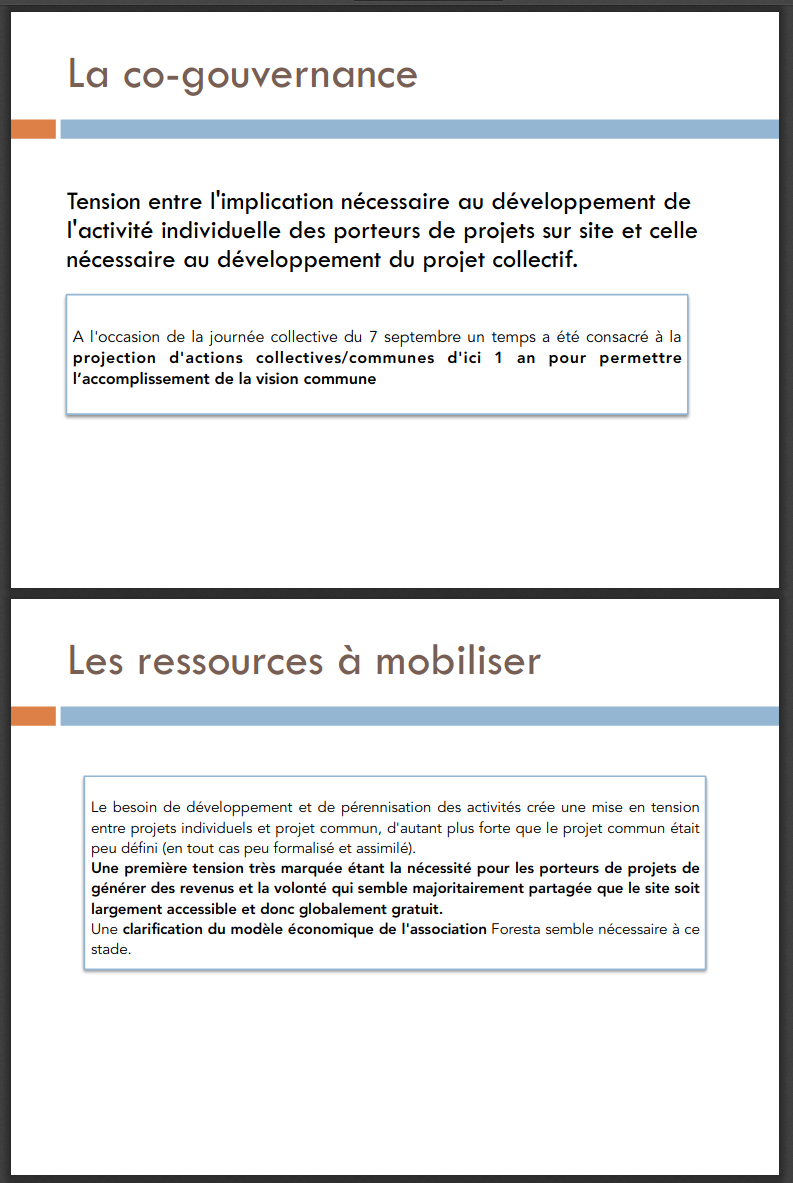
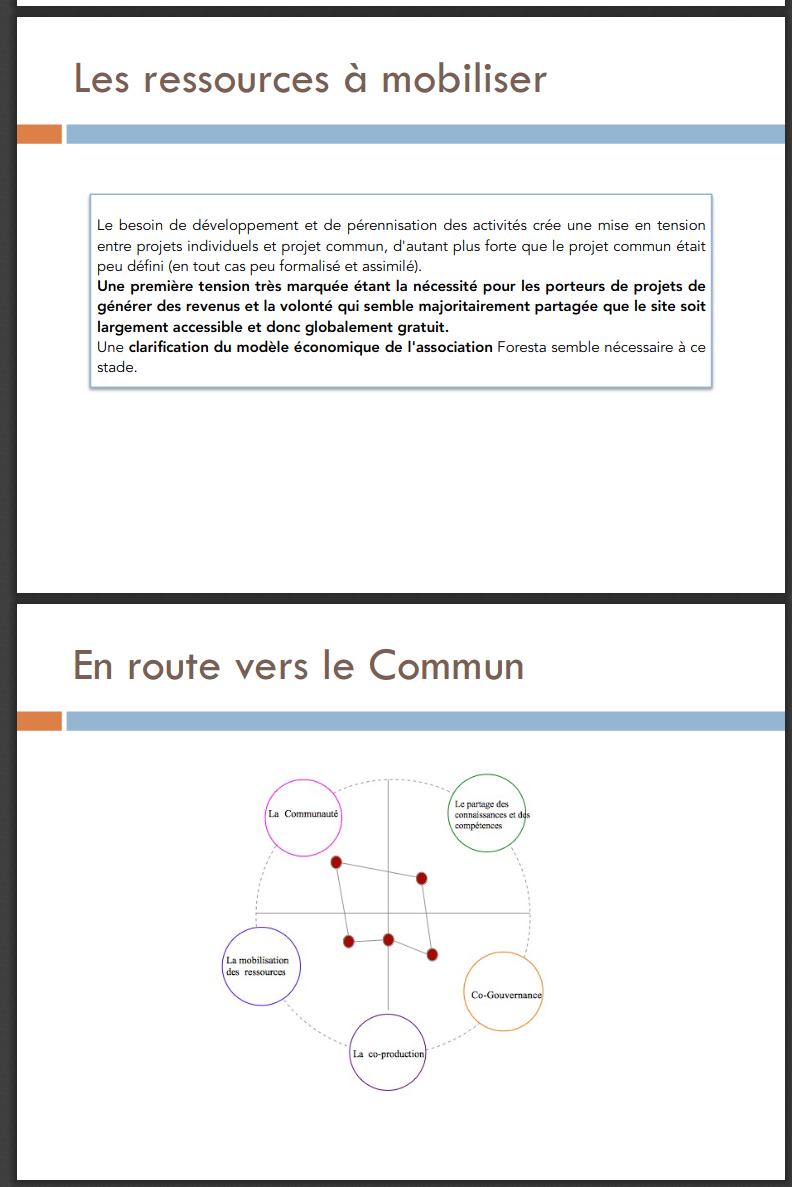
ColMeth: Kit Co-disseny de recerca col·laborativa. Peer-Produced Research Lab. Enric Senabre
Materials amb llicències lliures per descarregar i imprimir per dinàmiques de recerca col·lectiva, per tal de facilitar la ideació i la discussió de mètodes i processos. Un material senzill i visual per treballaren contexts acadèmics i educatius, identificar les preguntes i hipòtesis d’investigació. Veure primer la divergència i avançar cap a la convergència, a través també de relacions semàntiques.
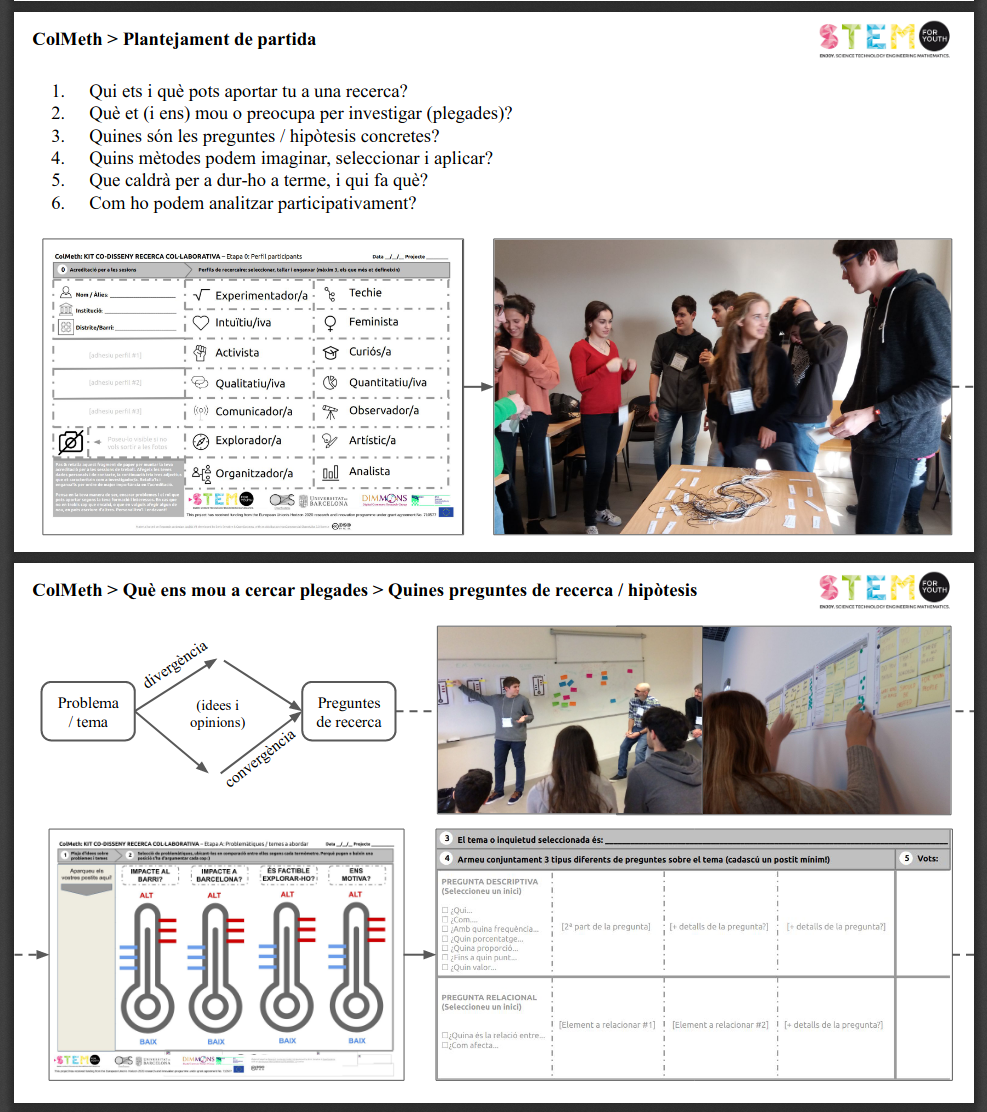
Fermentando metodologías para nutrir procesos. ColaBoraBora, Ricardo Antón
Compostar i coctelejar metodologies per posar-nos a disposició de cada situació i procés, de manera adaptativa i contextual; establint en cada cas els principis, pautes i components, que ens serveixin com a guia; fent menys coses més cuidades i cuidant-nos.
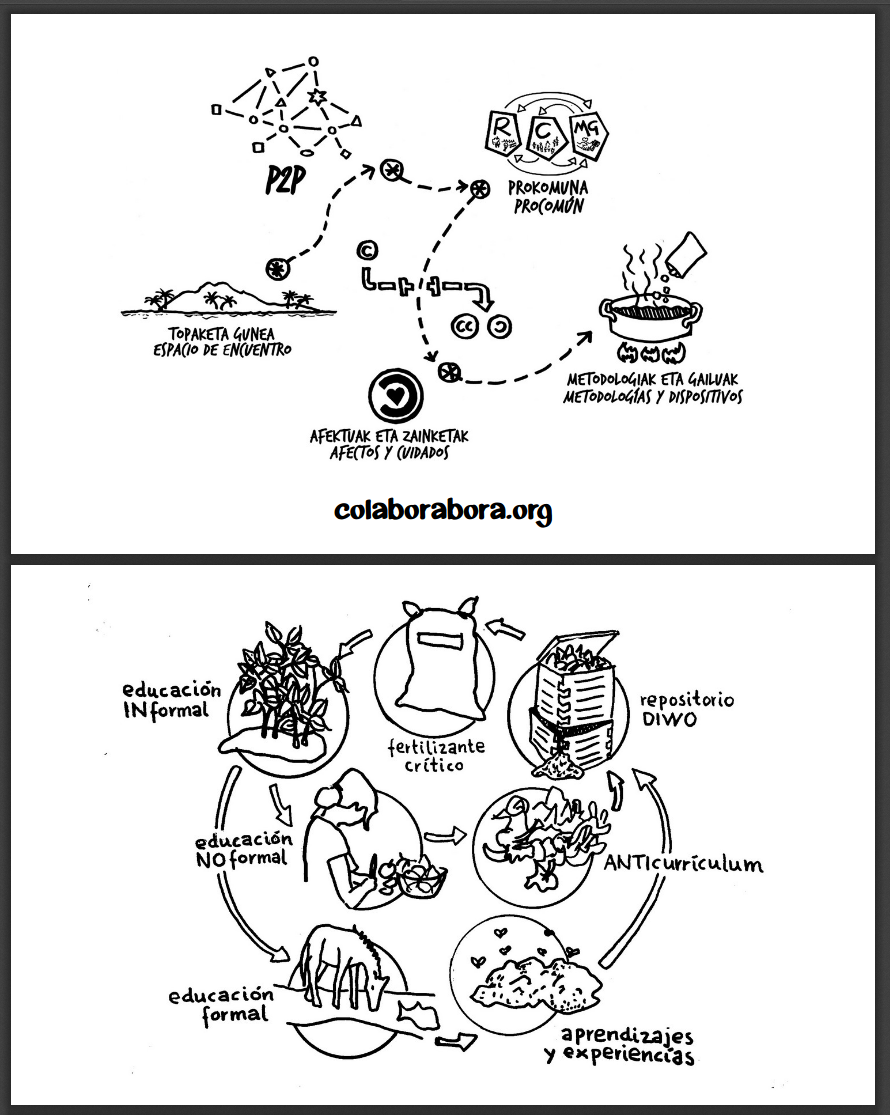
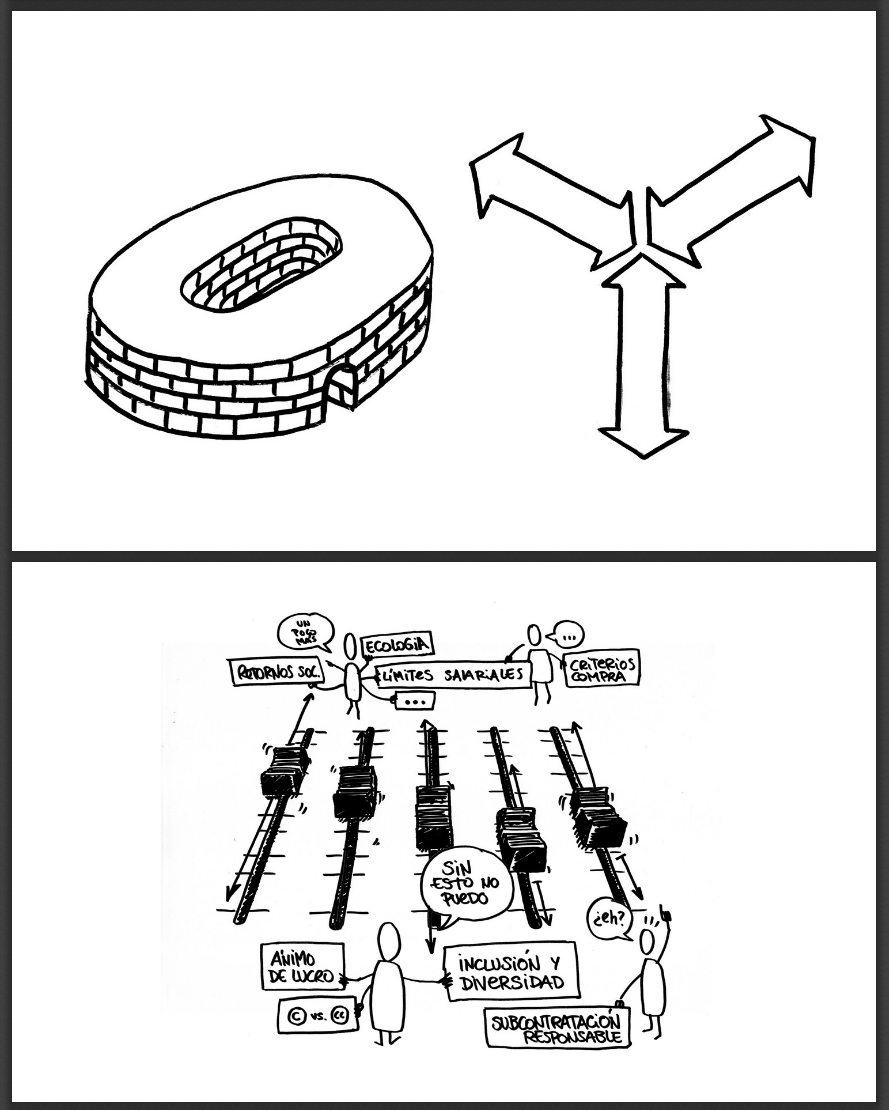
R-Urban: una estratègia de resiliència a través dels comuns. atelier d’architecture autogérée (aaa). Doïna M Petrescu
Una estratègia de resiliència local basada en una xarxa de centres cívics en els quals els habitants dels barris suburbans poden desenvolupar pràctiques de resiliència i crear circuits ecològics tancats localment. L’estratègia dóna suport a la governança col·lectiva entorn dels valors mediambientals, econòmics i socials. Des de 2011 s’han construït set centres d’aquest tipus a la regió parisenca (a Colombes, Gennevilliers i Nanterre) i dos centres a Londres (Hackney Wick i Poplar).
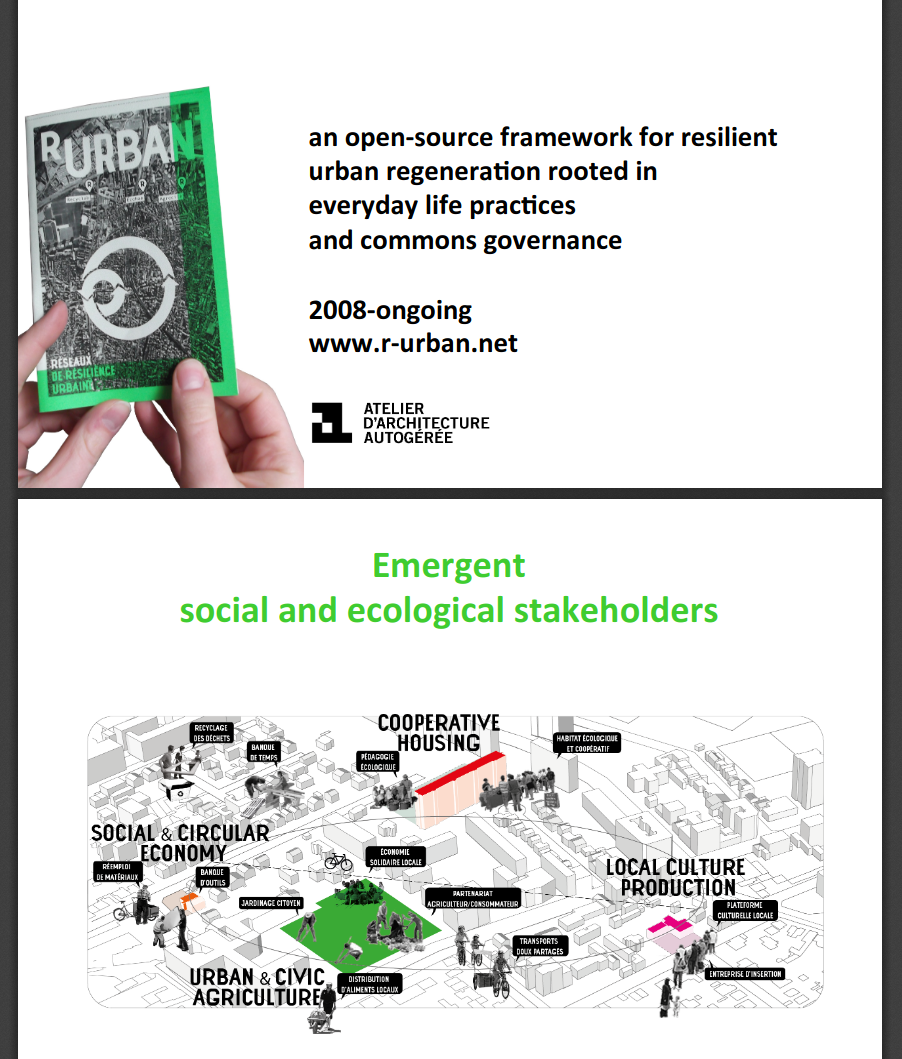
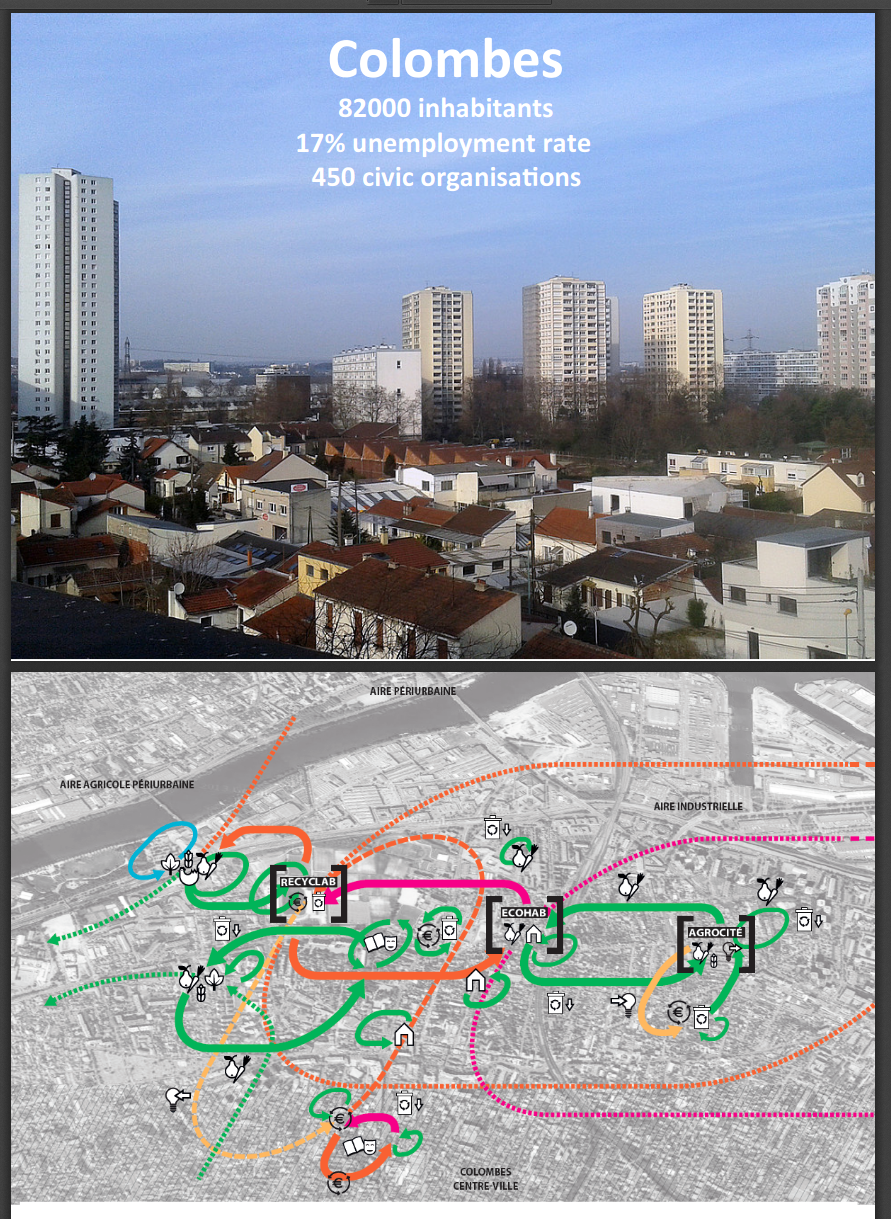
Calculant el valor del procomú. atelier d’architecture autogérée (aaa). Doïna M Petrescu
Per veure com calcular el retorn de la inversió de l’economia comunitària a Colombe. Basat en el fet que hi ha una inversió que dóna suport a la supervivència de tots i permet consumir per menys i que hi ha un retorn no necessàriament monetari (reducció empremta carboni, augmentar aspectes ètics de la producció, expansió procomunes). Es monetitza aquest retorn, per parlar “el mateix” idioma que els inversors immobiliaris i els gestors del municipi, i es mostra que amb una intervenció, com per exemple la de R-Urban (presentada abans) el valor del que és invisible augmenta i és bo per al planeta i per a la comunitat.
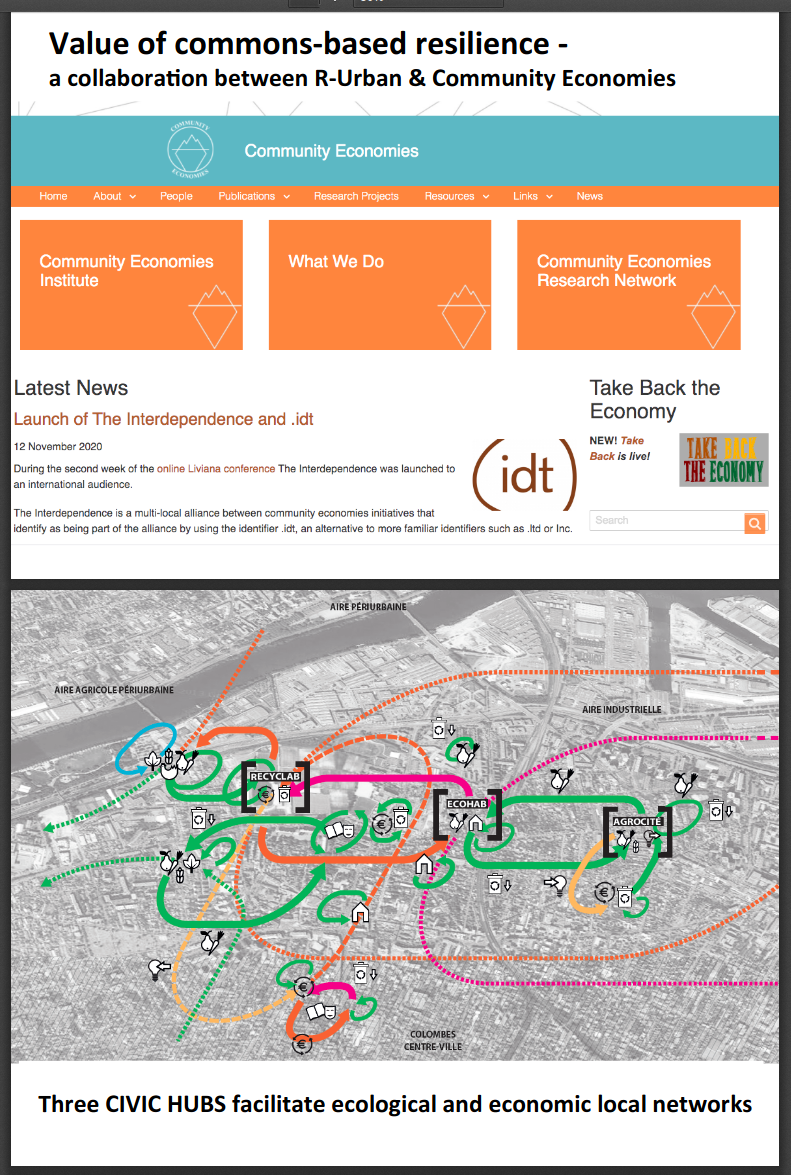
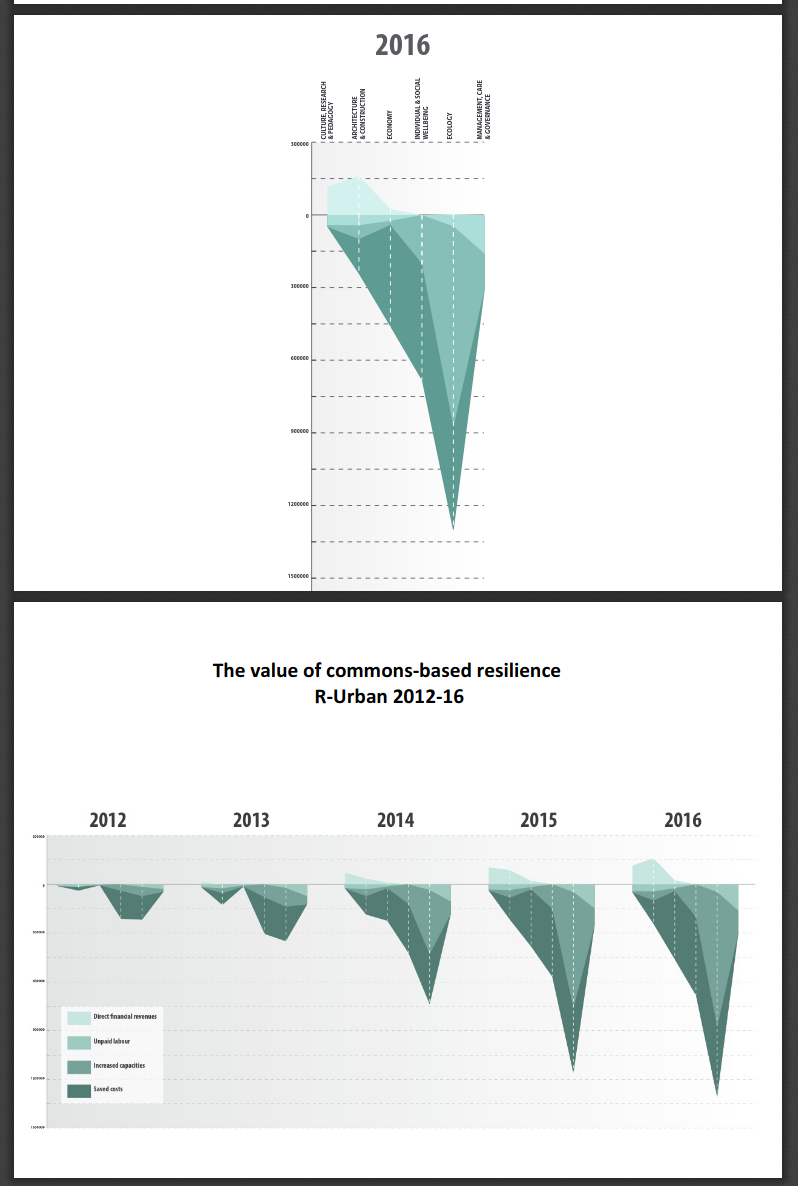
Transition Action. France Nature Environnement. Lou-ann Hennequin
Construir un full de ruta regional (un pla d’acció estratègic) per fer de la sobrietat, els comuns i la low-tech (tecnologia de baix impacte) els futurs elements centrals de les polítiques ambientals a la regió de Borgonya Franche Comté
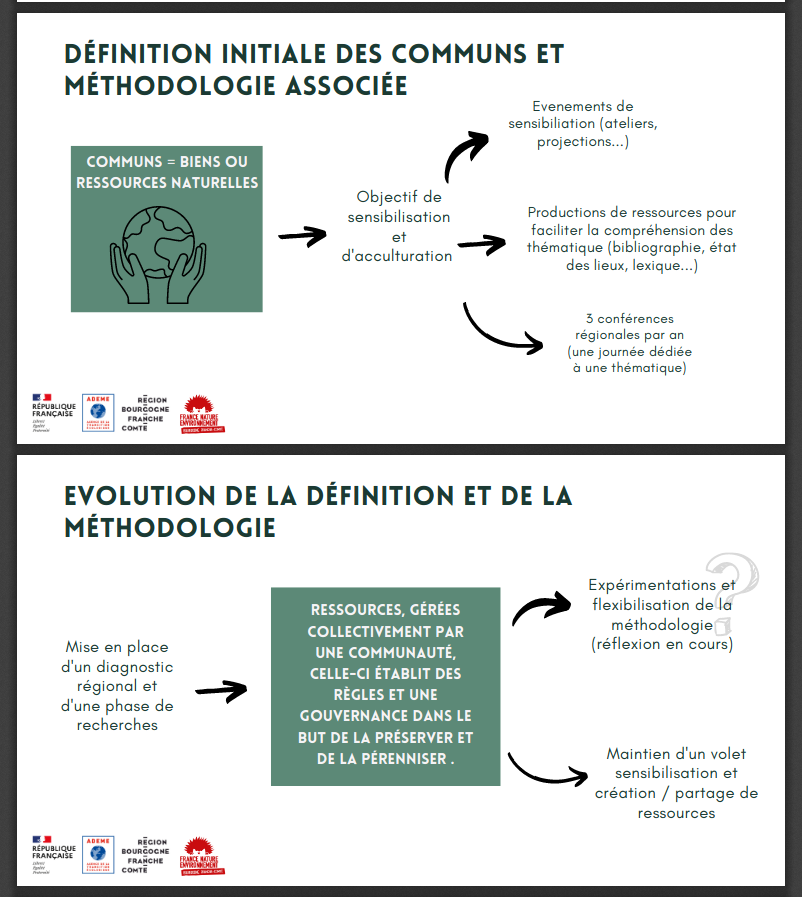
Projecte Betula: Promoció integral dels pobles del Cadí Moixeró a través del paisatge. L’Arada Creativitat Social. Marina Vilaseca i Ferran Canudas
Promoció integral dels pobles del Cadí-Moixeró és un projecte de dinamització local i comunitària iniciat a la tardor del 2018 juntament amb l’Ajuntament de Saldes i el Parc Natural del Cadí-Moixeró. Consisteix en afrontar debats, reptes i accions de manera col·lectiva per transitar cap a un hortitzó de sostenibilitat territorial.
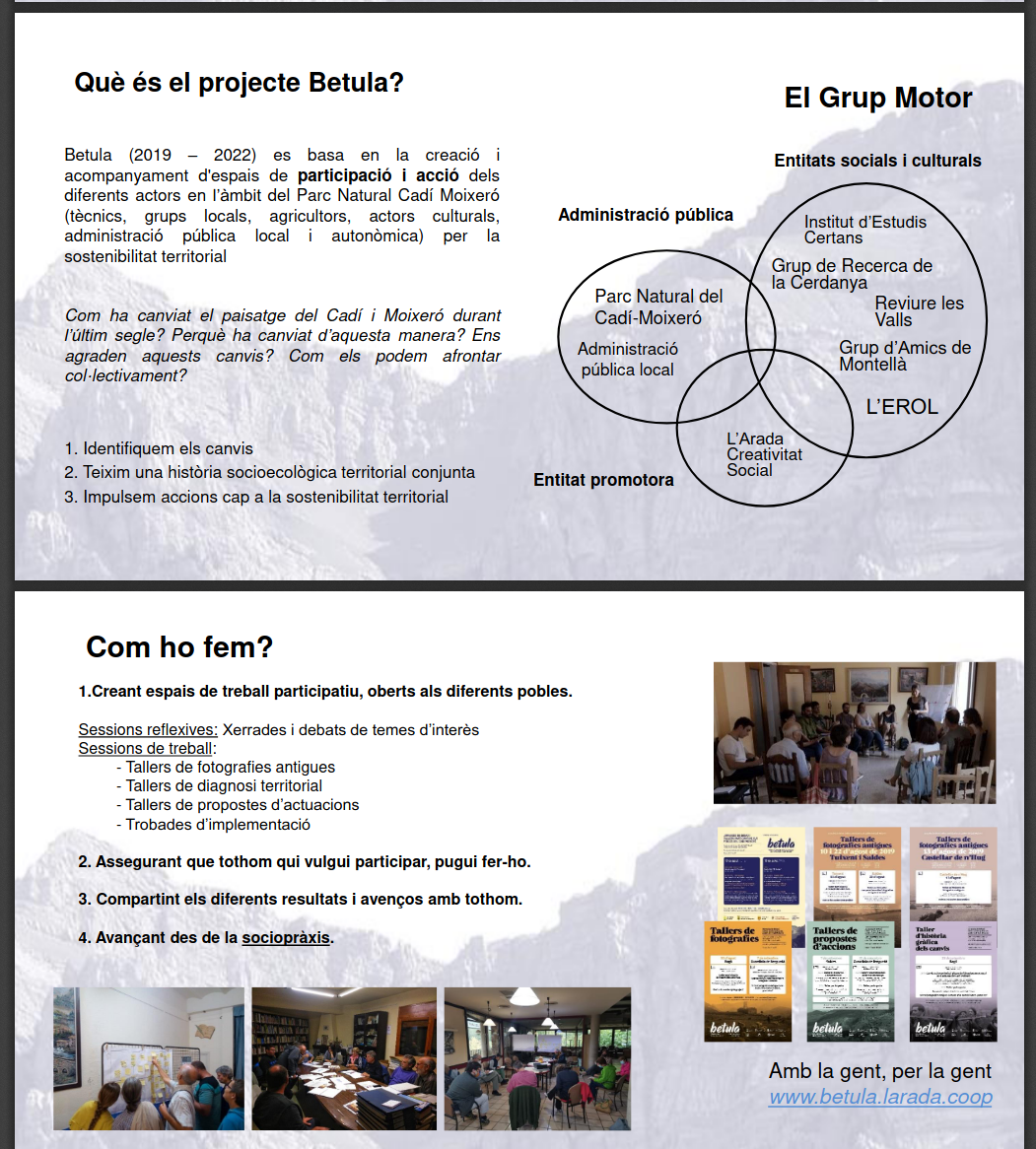
Escola Rural D’Economia. El dibuix és la nova comptabilitat. Community Economies Institute. Kathrin Böhm
El projecte, anomenat «corrents subterrànies rurals» té el propòsit de tornar a visibilitzar el coneixement sobre allò rural, fem servir el dibuix per compartir i recollir coneixements. Es va fer observant, parant atenció, prenent notes . Hi van participar 800 dones, que tot i que no llegien els seus dibuixos com a economia, dibuixant, van mostrar el valor econòmic d’allò que dibuixaven i els va servir per comunicar i adonar-se que el que feien era un procomú. Vegeu vídeo
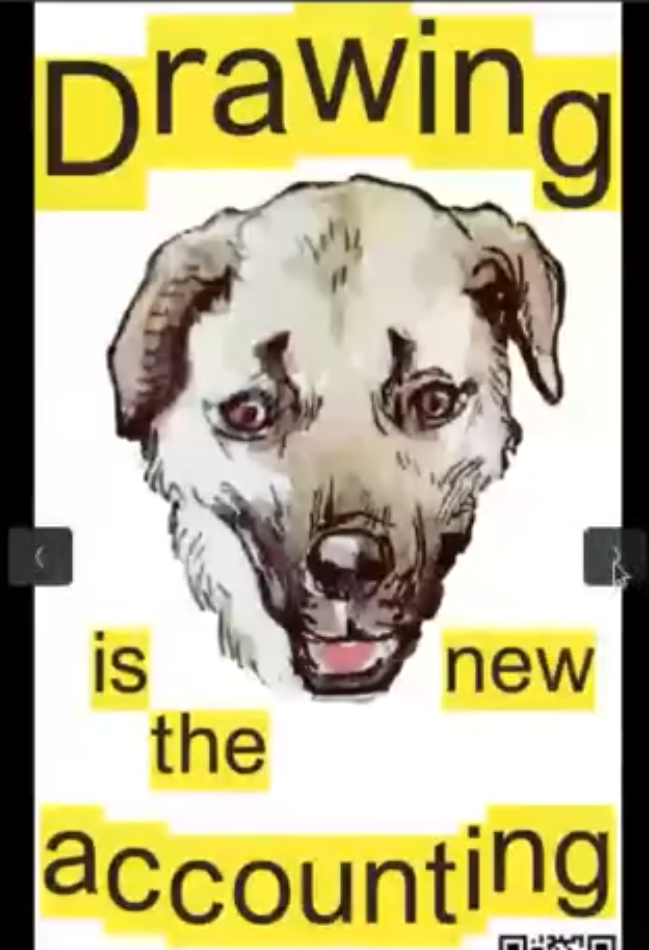

Les llengües, el llenguatge i la documentació
Parem especial atenció a les llengües com a procomú, són un bé intangible que cuidem de manera col·lectiva. Els imperis, el colonialisme i l’expansionisme, han fet servir algunes llengües com a instrument operatiu i de domini, mentre han minoritzat i sovint perseguit, altres llengües.
Les llengües que han estat instrument de dominació, son ara una eina valuosa que permet comunicar moltes persones i que aprofitem.
Però la llengua és un procomú que s’actualitza constantment, quan la fem servir en les interaccions humanes i que mor quan la deixem de fer servir o la restringim només a determinats àmbits.
Hem volgut fer una sessió amb traducció simultània perquè cadascú pugui parlar amb una llengua amb la qual se senti més o menys còmode. I fem servir també el català, que és la nostra llengua pròpia, perquè pensem que és important que quan algú porta la coordinació d’una trobada o quan es fa presencial en un lloc, es faci servir la llengua del lloc. I compartim amb moltes de les que som aquí, l’interès per traduir continguts, per explorar els matisos del llenguatge, en totes aquelles paraules que tenen a veure amb el procomú.
També vam demanar els ponents que omplissin una fitxa amb un sistema de classificació que hem anat testejant i utilitzant per ordenar projectes en la wiki semàntica de Teixidora (o en qualsevol altra wiki semàntica). La idea és documentar les iniciatives de manera que puguem fer-ne un seguiment i identificar-les, perquè serveixin per fer-ne rèpliques o simplement per aprendre unes de les altres, poder accedir a com una comunitat ha trobat la manera de donar-se resposta a una necessitat i poder-ho replicar o replicar-ne elements, en el nostre territori. Volem seguir treballant aquesta idea, agosarada però possible, i tenim intenció de seguir-la treballant en la trobada a Mondeggi.
Pad de treball: https://pad.femprocomuns.cat/p/Transitant_international_041022
Presentacions (diapositives)
